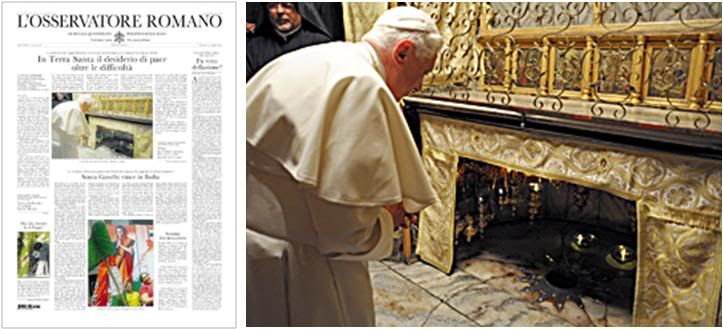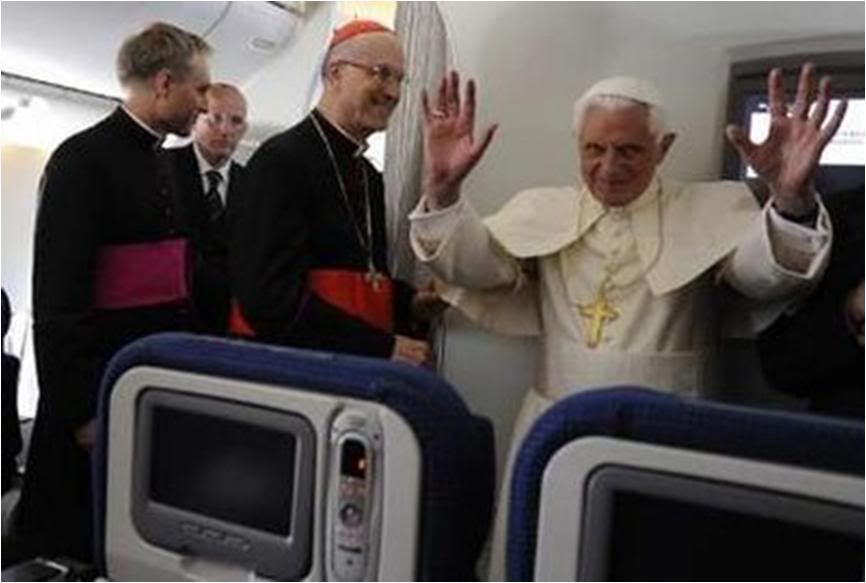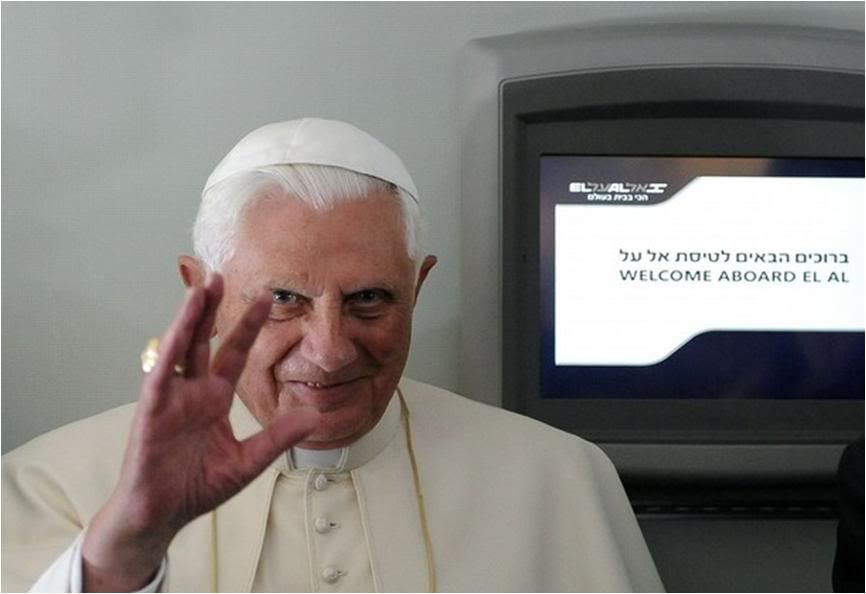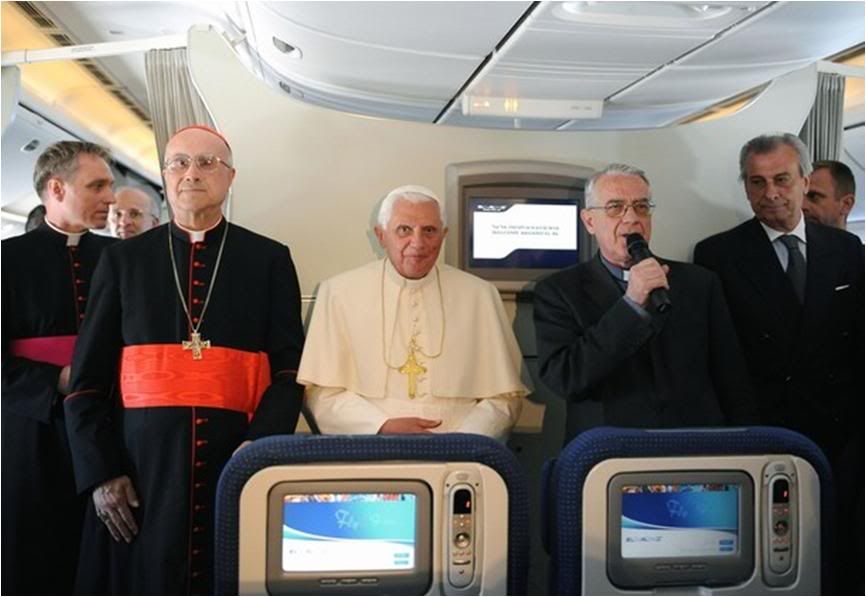
 In the Holy Land - a desire for peace
In the Holy Land - a desire for peace
above and beyond the difficulties
Translated from
the 5/17/09 issue of

 The Pope's statement to newsmen on board the papal flight on the return from Tel Aviv to Rome on Friday afternoon:
The Pope's statement to newsmen on board the papal flight on the return from Tel Aviv to Rome on Friday afternoon:

Dear friends,
Than you for the work you have been doing, I imagine how difficult it must have been, surrounded as it was by so many problems, so much moving about, etc. So I wish to thank you for having accepted all these difficulties in order to inform the world about this pilgrimage, thus inviting others to take part in the pilgrimage to the holy sites.
I briefly summarized this trip in my address at the airport, and I do not wish to add much. Though I can cite so many details, such as that moving descent to the deepest point on earth at the Jordan River, which, for us, is also a symbol of the descent of God, the descent of Christ to the most profound points of human existence; the Cenacle, where the Lord gave us the Eucharist, where the Pentecost took place, the descent of the Holy Spirit; the Holy Sepulchre, and so many other impressions, but I don't think this is the time to dwell on them.
Nonetheless, I would like to make a few points briefly. I had three fundamental impressions:
The first is that I found everywhere, in all the environments - Muslim, Christian, Jewish - a decided readiness for inter-religious dialog, for encounters and collaboration among the religions.
It is important that everyone sees this, not only as something, shall we say, inspired by political reasons arising from the given situation, but as a fruit of the same nucleus of faith.
Because to believe in one God who created us all, Father to all of us, to believe in this God who created mankind as a family, to believe that God is love who wants love to be the dominant force in the world, implies such an encounter, the necessity of such an encounter, of dialog, of collaboration, as an exigency of faith itself.
The second point: I also found an ecumenical climate that is very encouraging. We had so many encounters of great cordiality with the Orthodox world. I was able to speak to a representative of the Anglican Church and two Lutheran representatives, and one can see that the very atmosphere in the Holy Land encourages ecumenism.
And the third point: there are huge difficulties [in the region] - we know that, we have seen and felt that. But I have also seen a profound desire for peace on the part of everyone.
The difficulties are ever more visible, and we should not hide them - they are there, they must be cleared up. But the common desire for peace, for fraternity, is not as visible, and I think we should also speak of this, encourage everyone in the will to find solutions which will certainly not be easy for these difficulties.
I came as a pilgrim for peace. Pilgrimage is an essential element in many religions. It is in Islam, in the Jewish religion, and in Christianity. It is also the image of our existence, which is a journey forward, towards God, and therefore, towards the communion of mankind.
I came as a pilgrim, and I hope that many will follow these steps and thus encourage unity among the peoples of this Holy Land, and become messengers of peace to them.
Thank you.

 Holy Land prelates on the Papal pilgrimage:
Holy Land prelates on the Papal pilgrimage:
The Pope has planted hope -
Now it's time for everyone to work for peace
by Gianluca Biccini
Translated from
the 5/17/09 issue of

JERUSALEM - "Benedict XVI has planted seeds of hope in these places where everything recalls the Gospel. It is now up to us, pastors of this small flock, to do what we can so that they may bear fruits of peace, reconciliation and unity."
Both the Latin Patriarch of Jerusalem and the Franciscan Custodian of the Holy Land used similar words to describe the Pope's recent pilgrimage to the Holy Land. Both were with him every step of the way during eight very intensely active days.
Both increasingly became certain that the Pope's trip was fully achieving its objectives and that now it is the turn of all the Catholics - from the highest ranking prelate down to the most humble lay faithful - in these places blessed by the earthly passage of the Lord, to stay on the path indicated by the Successor of Peter.
"Above all, he has given us conviction and courage," said Mons. Fouad Twal, speaking in behalf of the Assembly of Catholic Ordinaries (Bishops) of the Holy Land. "We are not expecting miracles, but we should pray and give the Lord time to harvest what has been sown."
By design, one of Benedict XVI 's recurrent messages during the trip was to call on Christians not to abandon the land of their ancestors.
"He has called on us to stay, to endure, notwithstanding the complexities of the situation," Mons. Twal continues, "if only because these are also the places associated with the Cross. It is a challenge that must be accepted even in tragic circumstances. The Pope himself could see with his own eyes and touch with his hands the difficulties that we have to live with every day. This makes us feel him closer to us, to feel the closeness of the universal of the Church. The voice of the Pope reaches around the world and now, we hope for more prayers for the Holy Land, greater solidarity in every sense."
A particular role in this arduous path to peace among all the peoples of the region can be played by the family. Benedict XVI concluded - in celebrating two Masses dedicated to the family, first in Amman then in Nazareth - a triennium declared by the local Church to revive and revalue this fundamental social institution.
"I think it was particularly important for Jordan," said Mons. Twal, who is Jordanian by birth. "The predominantly tribal structure of society, focused around typically traditional faith, necessarily rests on the family as an institution. On Sundays, everyone goes to Church together - grandparents, parents and children - and perhaps, it is not by chance that in Jordan, political and family stability coincide".
These family values also reflect on vocations for the consecrated life. During the Pope's visit, Mons. Twal repeaedly pointed with pride toi the fact that all available openings to the seminary in Jordan had been taken, requiring the opening of a branch.
The situation is different in Israel and the Palestinian Territories where Christians are simply exhausted by the incessant conflict.
"Sixty years of war," he said, "is too much for everyone. People can no longer endure it, and that is why they are leaving. But I see some prospect of hope. The visit of the Pope will be followed by a visit from the President of the United States, and recent signals from the international community and from Arab and Israeli leaders themselves lead us to hope".
"Thus I say to the children of our flock: 'You are called on to live a mission. If you go away, perhaps you will find work, you will have a home, and you will never have to go through checkpoints, but you will not find the Holy Land elsewhere'."
[I am troubled by Mons. Twal's obsessive objection to checkpoints. For as long as Palestinian terrorists are being trained and obviously just waiting for any opportunity to target Israeli civilians, Israel cannot be faulted for having these checkpoints. It would be derelict to its duty to protect its citizens if it did not have them. Christians, including priests, have to Live with it, as everyone else does - it's a land at war; that's part of the Cross that Christian residents have to bear for now.
No one has complained that the Israelis abuse the use of these checkpoints [just as no one questioned the use of Allied checkpoints between the two Berlins at the time of the Wall]. Of course, it is an inconvenience; but it's something residents have to factor into their daily life for now. The Israelis do not have a choice: Palestinian terrorists have not renounced violence and continue to vow they will not stop until Israel is driven out to sea.]
Fr. Pierbattista Pizzaballa, head of the Franciscan Order's centuries-old Custody of the Holy Land, sees an 'absolutely positive' net gain from the Holy Father's visit.
This young and highly cultured friar, who has been entrusted with the great responsibility of managing the holy sites of Christianity, underscores above all the inter-religious value of Benedict XVI's visit.
"First, he has infused strength in the Christians of the Holy Land. And in the inter-religious context, he has spoken with clarity to Muslims and Jews alike."
On the eve of the Pope's visit, he said there had been apprehensions that the visit could be instrumentalized by various sides, but "the Pope, without rhetoric, simply said what is in his heart, in a spirit of freedom and serenity, which left a sense of gratitude as well as of liberation among his listeners. And to us, he left the certainty that we can do everything in the light of greater respect for the local Church".
Reviewing the carious stages of the pilgrimage, Fr, Pizziballa recalled two extremes: "the Cenacle - poor when seen exteriorly, but nevertheless spiritually intense", and "the Mass of Nazareth, attended by an ocean of the faithful".
Both, he said, are almost a metaphor for the Holy Land, which is both "the Cenacle with its poverty, its difficulties, its isolation", and "Nazareth with the beauty, enthusiasm and passion of the Mass". and in between, the Mass in Bethlehem which was memorable and will leave an indelible sign."
Then, there were the Pope's repeated appeals for peace, "which echoed in each of the 31 addresses delivered by the Holy Father during the trip - a record for his Pontificate - but was also repeated in all the languages of the region: SHALOM, SALAAM, PEACE - which we saw on all the streamers and posters, which we heard in various songs, slogans and chants."
Now, says Fr. Pizzaballa, "it is necessary to prepare this peace, which must be based on the integrity and dignity of each person, on relationships that are absolutely free, and on reciprocal trust.It will require much time. But the signals and gestures during the Pope's visit pointed to the goal, and more importantly, that this goal can be reached. Not as a utopian dream, but something which, if genuinely willed, can become reality."
Finally, the Pope, he said, recalled the ideals of St. Francis many times over when he spoke about walls, the inability to speak to each other, that can be circumvented with simple actions, as St. Francis did with the sultan.
"This recognition, besides making us very happy," said Fr. Pizzaballa, "also stimulates us to go on doing our work with passion and love. Above all, we will continue to help Christians to stay where they are, supporting them with homes and employment, which are the two cornerstones of our multi-century presence in the Holy Land."
[Modificato da TERESA BENEDETTA 19/05/2009 06:29]